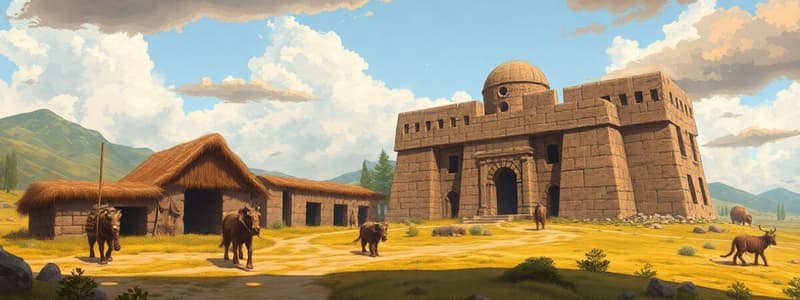Podcast
Questions and Answers
Which of the following is NOT a division of the Prehistoric period?
Which of the following is NOT a division of the Prehistoric period?
- Medieval Age (correct)
- Bronze Age
- Stone Age
- Iron Age
The Paleolithic Age lasted from 250KYA to 12KYA.
The Paleolithic Age lasted from 250KYA to 12KYA.
True (A)
What major climatic event occurred during the Paleolithic Age?
What major climatic event occurred during the Paleolithic Age?
last ice age
The Clovis peoples are known for their distinctive __________ and stone tools.
The Clovis peoples are known for their distinctive __________ and stone tools.
Match the archaeological sites with their corresponding age estimates:
Match the archaeological sites with their corresponding age estimates:
What does the Clovis First Theory propose about the migration to the Americas?
What does the Clovis First Theory propose about the migration to the Americas?
The Beringia land bridge formed during the ice age allowed for early human migration.
The Beringia land bridge formed during the ice age allowed for early human migration.
What was one significant consequence of the ice age at the end of the Paleolithic?
What was one significant consequence of the ice age at the end of the Paleolithic?
The Iron Age lasted from _____ to _____ years ago.
The Iron Age lasted from _____ to _____ years ago.
Which of the following discoveries cast doubt on the Clovis First Theory?
Which of the following discoveries cast doubt on the Clovis First Theory?
Flashcards are hidden until you start studying
Study Notes
Prehistoric Period Overview
- Spanning from 250,000 years ago (KYA) to 3,000 years ago (YA), this period lacks written records.
- Divided into three main eras: Stone Age, Bronze Age, and Iron Age.
Stone Age
- Lasted from 250 KYA to 5 KYA.
- Further categorized into:
- Paleolithic (250 KYA to 12 KYA)
- Mesolithic (12 KYA to 10 KYA)
- Neolithic (10 KYA to 5 KYA)
Paleolithic Age
- Coincided with the last ice age, causing significant extinction events, including large mammals.
- Homo Sapiens faced near extinction but adapted and migrated.
- Ice age dynamics created land bridges while inhibiting migration in certain areas.
Migration to the Americas
- Early humans began migrating from Eurasia to North and South America as the ice age ended.
- Clovis peoples are recognized as the first inhabitants of the Americas.
- Distinctive spear points and tools discovered near Clovis, New Mexico, in the 1920s served as archaeological evidence.
Clovis First Theory
- Proposes migration through the Bering Strait (around 13 KYA) from Siberia to Alaska on foot using the land bridge Beringia.
- Clovis peoples then navigated southward through gaps in the Canadian ice sheets.
Pre-Clovis Evidence
- Findings at several archaeological sites:
- Meadowcroft, Pennsylvania (19 KYA)
- Pedro Furada, Brazil (30 KYA)
- Monteverde, Chile (30 KYA)
- These dates predate the Clovis thought timeline, leading to revised migration theories.
Coastal Route Theory
- Suggests migration by boat around 20 KYA.
- Pre-Clovis peoples likely used canoes from Siberia, traveling along the coastlines of North America and South America.
Solutrean Hypothesis
- Proposes that around 21 KYA, people from the Solutré region of France migrated to North America via Atlantic pack ice.
- Similar tools found in both Solutrean and North American sites strengthen this hypothesis.
Theories' Interconnectedness
- Multiple migration routes might have been utilized; Clovis and Pre-Clovis peoples may have arrived in North America through various means, combining overland and maritime routes.
Studying That Suits You
Use AI to generate personalized quizzes and flashcards to suit your learning preferences.




